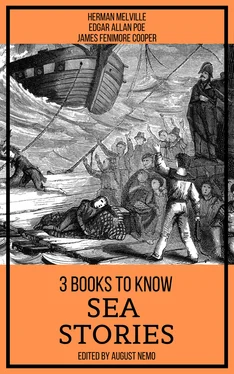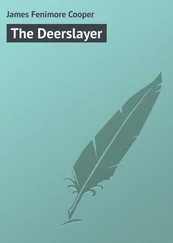What of it, if some old hunks of a sea-captain orders me to get a broom and sweep down the decks? What does that indignity amount to, weighed, I mean, in the scales of the New Testament? Do you think the archangel Gabriel thinks anything the less of me, because I promptly and respectfully obey that old hunks in that particular instance? Who ain't a slave? Tell me that. Well, then, however the old sea-captains may order me about—however they may thump and punch me about, I have the satisfaction of knowing that it is all right; that everybody else is one way or other served in much the same way—either in a physical or metaphysical point of view, that is; and so the universal thump is passed round, and all hands should rub each other's shoulder-blades, and be content.
Again, I always go to sea as a sailor, because they make a point of paying me for my trouble, whereas they never pay passengers a single penny that I ever heard of. On the contrary, passengers themselves must pay. And there is all the difference in the world between paying and being paid. The act of paying is perhaps the most uncomfortable infliction that the two orchard thieves entailed upon us. But being paid,—what will compare with it? The urbane activity with which a man receives money is really marvellous, considering that we so earnestly believe money to be the root of all earthly ills, and that on no account can a monied man enter heaven. Ah! how cheerfully we consign ourselves to perdition!
Finally, I always go to sea as a sailor, because of the wholesome exercise and pure air of the fore-castle deck. For as in this world, head winds are far more prevalent than winds from astern (that is, if you never violate the Pythagorean maxim), so for the most part the Commodore on the quarter-deck gets his atmosphere at second hand from the sailors on the forecastle. He thinks he breathes it first; but not so. In much the same way do the commonalty lead their leaders in many other things, at the same time that the leaders little suspect it. But wherefore it was that after having repeatedly smelt the sea as a merchant sailor, I should now take it into my head to go on a whaling voyage; this the invisible police officer of the Fates, who has the constant surveillance of me, and secretly dogs me, and influences me in some unaccountable way—he can better answer than any one else. And, doubtless, my going on this whaling voyage, formed part of the grand programme of Providence that was drawn up a long time ago. It came in as a sort of brief interlude and solo between more extensive performances. I take it that this part of the bill must have run something like this:
"Grand Contested Election for the Presidency of the United States.
"WHALING VOYAGE BY ONE ISHMAEL.
"BLOODY BATTLE IN AFFGHANISTAN."
Though I cannot tell why it was exactly that those stage managers, the Fates, put me down for this shabby part of a whaling voyage, when others were set down for magnificent parts in high tragedies, and short and easy parts in genteel comedies, and jolly parts in farces—though I cannot tell why this was exactly; yet, now that I recall all the circumstances, I think I can see a little into the springs and motives which being cunningly presented to me under various disguises, induced me to set about performing the part I did, besides cajoling me into the delusion that it was a choice resulting from my own unbiased freewill and discriminating judgment.
Chief among these motives was the overwhelming idea of the great whale himself. Such a portentous and mysterious monster roused all my curiosity. Then the wild and distant seas where he rolled his island bulk; the undeliverable, nameless perils of the whale; these, with all the attending marvels of a thousand Patagonian sights and sounds, helped to sway me to my wish. With other men, perhaps, such things would not have been inducements; but as for me, I am tormented with an everlasting itch for things remote. I love to sail forbidden seas, and land on barbarous coasts. Not ignoring what is good, I am quick to perceive a horror, and could still be social with it—would they let me—since it is but well to be on friendly terms with all the inmates of the place one lodges in.
By reason of these things, then, the whaling voyage was welcome; the great flood-gates of the wonder-world swung open, and in the wild conceits that swayed me to my purpose, two and two there floated into my inmost soul, endless processions of the whale, and, mid most of them all, one grand hooded phantom, like a snow hill in the air.
Chapter 2. The Carpet-Bag.

I stuffed a shirt or two into my old carpet-bag, tucked it under my arm, and started for Cape Horn and the Pacific. Quitting the good city of old Manhatto, I duly arrived in New Bedford. It was a Saturday night in December. Much was I disappointed upon learning that the little packet for Nantucket had already sailed, and that no way of reaching that place would offer, till the following Monday.
As most young candidates for the pains and penalties of whaling stop at this same New Bedford, thence to embark on their voyage, it may as well be related that I, for one, had no idea of so doing. For my mind was made up to sail in no other than a Nantucket craft, because there was a fine, boisterous something about everything connected with that famous old island, which amazingly pleased me. Besides though New Bedford has of late been gradually monopolising the business of whaling, and though in this matter poor old Nantucket is now much behind her, yet Nantucket was her great original—the Tyre of this Carthage;—the place where the first dead American whale was stranded. Where else but from Nantucket did those aboriginal whalemen, the Red-Men, first sally out in canoes to give chase to the Leviathan? And where but from Nantucket, too, did that first adventurous little sloop put forth, partly laden with imported cobblestones—so goes the story—to throw at the whales, in order to discover when they were nigh enough to risk a harpoon from the bowsprit?
Now having a night, a day, and still another night following before me in New Bedford, ere I could embark for my destined port, it became a matter of concernment where I was to eat and sleep meanwhile. It was a very dubious-looking, nay, a very dark and dismal night, bitingly cold and cheerless. I knew no one in the place. With anxious grapnels I had sounded my pocket, and only brought up a few pieces of silver,—So, wherever you go, Ishmael, said I to myself, as I stood in the middle of a dreary street shouldering my bag, and comparing the gloom towards the north with the darkness towards the south—wherever in your wisdom you may conclude to lodge for the night, my dear Ishmael, be sure to inquire the price, and don't be too particular.
With halting steps I paced the streets, and passed the sign of "The Crossed Harpoons"—but it looked too expensive and jolly there. Further on, from the bright red windows of the "Sword-Fish Inn," there came such fervent rays, that it seemed to have melted the packed snow and ice from before the house, for everywhere else the congealed frost lay ten inches thick in a hard, asphaltic pavement,—rather weary for me, when I struck my foot against the flinty projections, because from hard, remorseless service the soles of my boots were in a most miserable plight. Too expensive and jolly, again thought I, pausing one moment to watch the broad glare in the street, and hear the sounds of the tinkling glasses within. But go on, Ishmael, said I at last; don't you hear? get away from before the door; your patched boots are stopping the way. So on I went. I now by instinct followed the streets that took me waterward, for there, doubtless, were the cheapest, if not the cheeriest inns.
Читать дальше














